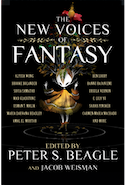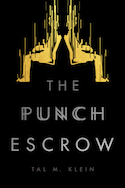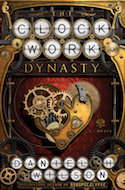Future Alternative Past: Present tense
Every month, Nisi Shawl presents us with news and updates from her perch overlooking the world of science-fiction, fantasy, and horror. You can also look through the archives of the column.
Conflict vs. tension
Something's got to happen. Who wants to read about happy characters dwelling contentedly in the land of status quo with no worries, no desires, no agendas? Paying customers prefer action. We authors love our characters (who are often facets of our own selves), but in pursuit of stories others will read we torture and provoke them, prod them, plumb their depths.
Conventional Western wisdom declares that at their heart, good stories are about conflict. In the U.S. we’re taught to categorize the types of conflict found in a story in simplistic terms: Man against Nature, Man against Society, Man against Man, and Man against Himself. (Note the gender specificity.) And writers are trained to satisfy readers with these closely educated tastes.
But I counsel my students to aim for a slightly different focus. Because conflict can be just as boring as its absence.
Consider the pitched battles of epic fantasy. Good fights evil, and unless we’re in the territory of grimdark authors like Joe Abercrombie, the outcome’s pretty much a foregone conclusion. Though epic battle is frequently deemed a Western trope, its use is by no means restricted to European inspired fantasies: despite my deep admiration for his short fiction, Ken Liu’s novel The Grace of Kings wore out my patience with its repetition of military scenarios well before I finished the book, and that was only the first volume of his Dandelion Dynasty trilogy. Battle after battle. War after war.
So what else is there? What keeps readers scrolling? I say it’s tension.
Kishōtenketsu, a traditional East Asian narrative structure explained in depth on the tumblr of still eating oranges, is one alternative. As Nils Odlun notes in the first article linked, in kishōtenketsu the author turns their focus from conflict to a different aspect of the story. Conflict may produce the tension necessary to attract and keep readers’ attention — there may be a struggle, complete with winners and losers — or there may be something else going on that dramatically changes what the characters and, through them, the audience, experience. The point is not the event depicted on the page but its effect.
Weirdly, my tension epiphany occurred as I watched the end of Doctor Zhivago. Yes, I know this is a deeply problematic movie, and not even SFFH — but I still managed to learn from it. As Omar Sharif chased Julie Christie through the streets of Moscow, dying of a heart attack before getting her to notice him, I was caught up in their story as never before. He had to reach her. He would never reach her. This gap between “What is” and “What must be” was the space where the spark of my imagination leapt to life. The arc it jumped.
Where else in fiction do I find these seductive lacunae? Lots of places. Karen Lord’s first novel, Redemption in Indigo, can be read as your standard conflict, but the djombi Lord’s heroine contests with for possession of the Chaos Stick is also, according to kishōtenketsu theory, the means of resolving the disequilibrium this prize’s presence creates. In other words, I find tension’s power there because I’m searching for it. I put it in my stories in hopes you’ll seek and see it or stumble across it or figure out somehow it’s there.
Recent books recently read

Looking at magic in unfamiliar ways, the emerging authors brought together in The New Voices of Fantasy (Tachyon) freshen up the genre’s much-sought sensawunda. Within these pages it’s everywhere: in amorous mobile skyscrapers, ravished tornado shelters, and blissfully ignorant anthropologists’ notebooks. Most effective are the tales of those whose difference could easily have disqualified them from inclusion in past authorial pantheons. The half-sulking, half-singing cadences of Sofia Samatar’s Hugo and Nebula Award-nominated “Selkie Stories Are for Losers” might not have made it into this newly formed canon because of her East African heritage, despite her academic status; the mazing reflections of Usman T. Malik’s British Fantasy Award-winner “The Pauper Prince and the Eucalyptus Jinn” might have been brutally trimmed back or eliminated altogether, their South Asian cultural currency disregarded as valueless. But we’re all so much the richer for the strange, beautiful wealth to be found throughout this entire book.

The Punch Escrow (Inkshares) by software marketer Tal Klein also affords a novice’s take on established SFFH tropes. As numerous YouTube videos and late-night TV hosts have pointed out, our Star Trekkian concept of teleportation basically boils down to a traveler’s duplication followed by their murder. In 1995 James Patrick Kelly addressed teleportation’s ethical dilemmas in his Hugo winning novelette "Think Like a Dinosaur"; Klein’s revisitation features a narrator whose day job is being a professional smartass and who lards the text with breezy, confident-sounding footnotes full of quantum foam and peeing mosquitoes. Good fun.

So what’s a new voice? What’s an old one? Is there anything in-between? Daniel H. Wilson, author of The Clockwork Dynasty, already has beaucoup books out, including the awesome Robopocalypse and its sequel, Robogenesis, and my personal nonfiction favorite, Where’s My Jetpack? Clockwork’s steampunky cover promises brass gears and leather and lots of them, and readers looking for the Retrofuturism typically associated with these trappings won’t be disappointed. Much of the book’s action takes place in 18th- and 19th-century Europe, with forays into modern times and also, interestingly, into the distant past of the Chinese empire. One of the novel’s two viewpoint characters is (this is not a spoiler, trust me) a robot created millennia ago by vanished supermen. Wilson’s academic expertise is robotics, enabling him to make his references to the spinning, metal-impregnated ceramics animating these Ur-androids’ somehow credible. According to him robots have been with us always. Though new, they’re incredibly old. A neat trick in perspective and a pleasing one.
Couple of upcoming cons
The self-proclaimed largest SFFH convention in the whole freakin universe, Dragon Con, is also home to the Dragon Awards. Like Worldcon’s Hugos, the Dragon Awards are recent victims of Puppy voting manipulation schemes. Unlike the Hugos, award categories include both comics and graphic novels, and four separate game varieties. This wide spectrum of choices reflects the literature-plus orientation of Dragon Con, with its weighty emphasis on movies, cosplay, and a myriad other ways to interface with the unknown.
Another large, multifarious SFFH shindig, Archon, has historically taken place in St. Louis, MO. Its occupancy of a hotel in Collinsville, IL likely has more to do with negotiated stay rates and facility availability than the travel advisory issued by the NAACP, but this is still a good opportunity to support a forty-year-old institution without validating its home state’s troublingly oppressive legislation. Plus Seanan McGuire tops this year’s list of Guests of Honor, and plenty of swoony pros are sure to attend among the approximately 2000 others showing up.